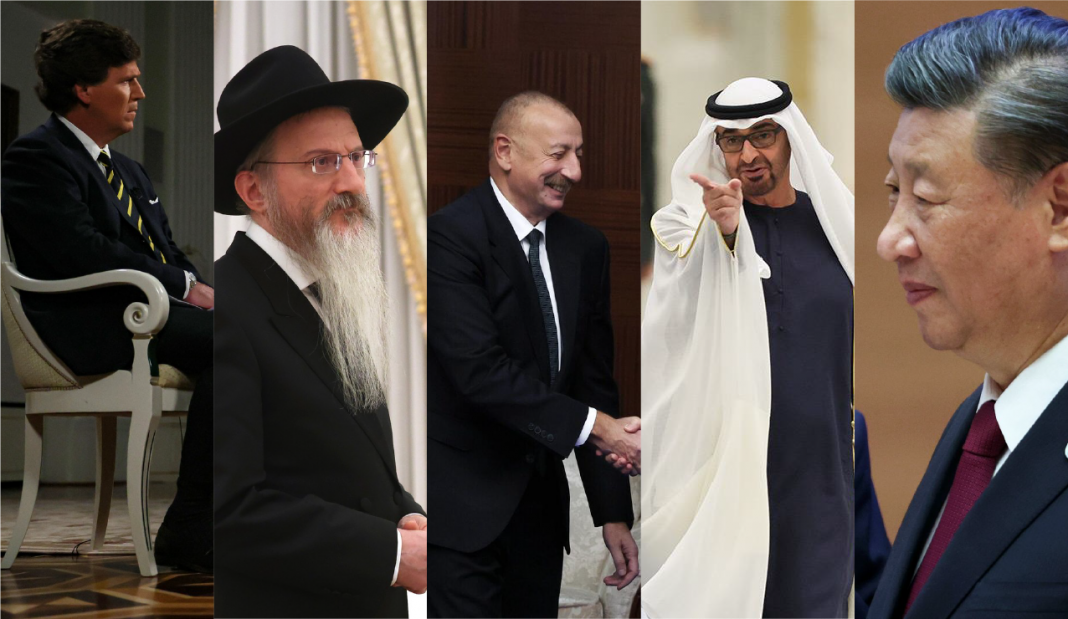This report describes the key events significantly influencing Russia’s political, economic, and social processes.
Assessing the past week’s results, we identify the following trends:
- The interview with Tucker Carlson, one of the most talked about events of the past week, is one of those speeches that was more worth waiting for than the actual performance. The interview, which was empty in meaning and content, in which Putin did not say anything new or extremely important, turned into a lecture on history with many factual errors. Unsurprisingly, the interview failed despite the excitement in information networks around Tucker Carlson’s arrival in Russia. The only hope of Kremlin supporters is that Tucker Carlson, now more of a politician than a journalist, arrived not so much for an interview but for personal communication with Putin and brought a specific message, which was discussed behind closed doors, and the interview is just a screen.
- At the same time, in the geopolitical arena, a negative trend towards a softening of Atiputin’s positions continues to persist: the theses “Putin the dictator” and “Putin the terrorist” began to be used much less frequently, and Russia’s aggression against Ukraine is increasingly being considered separately from Putin. In this case, several main factors can be identified. Firstly, strengthening the Global South’s positions is gradually blurring the information field; therefore, some accents are being softened. Secondly, the situation in the Middle East and several regional escalation trends are distracting factors that play against Ukraine and partly into the hands of Russia. Thirdly, the understanding of many politicians of the inevitability of Putin’s re-election for another presidential term leads to the need to look for common ground with Putin’s Russia.
- It is noteworthy that Vladimir Putin interrupted his election tour of Russian regions and focused on international contacts last week. A series of telephone conversations with the leaders of China, Azerbaijan and the UAE indicate that Russia’s isolation is gradually crumbling: he remains an outcast in the West. Still, he feels pretty confident in the company of leaders of the Global South, which he is trying in every possible way to demonstrate to the domestic electorate. It is possible that next week, the Russian president will switch back to the domestic agenda and visit the country’s southern regions.
This report highlights the following most relevant for Russia matters, which occurred on 5-11 February:
1. Telephone conversation between Vladimir Putin and the President of the UAE, Mohammed Al Nahyan;
2. Meeting with members of the Russian Government;
3. Meeting of Vladimir Putin with the Chief Rabbi of Russia, Berl Lazar, and the President of the Federation of Jewish Communities of Russia, Alexander Boroda;
4. Telephone conversation between Vladimir Putin and President of Azerbaijan Ilham Aliyev;
5. Telephone conversation between Vladimir Putin and Chinese President Xi Jinping;
6. Tucker Carlson interviewed Vladimir Putin ;
7. Meeting with permanent members of the Security Council.
This Content Is Only For Subscribers
- Telephone conversation between Vladimir Putin and the President of the UAE, Mohammed Al Nahyan
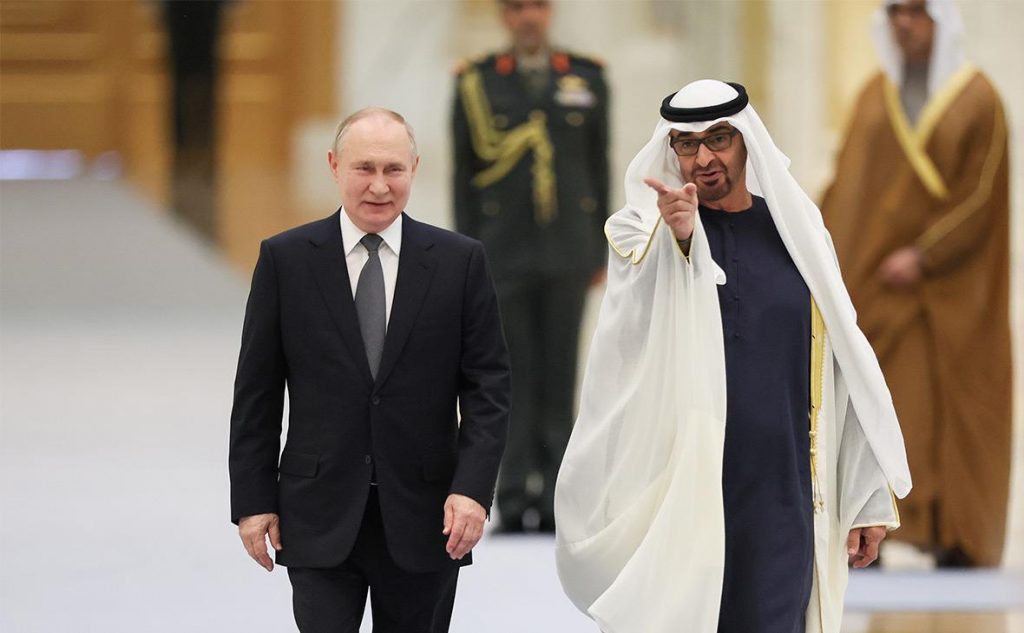
On Monday, February 5, Vladimir Putin had a telephone conversation with the President of the United Arab Emirates, Mohammed bin Zayed Al Nahyan. According to official statements of the parties, the main topics for conversation were the further development of friendly Russian-Emirati relations (within the framework of previously reached agreements during Putin’s visit to the United Arab Emirates on December 6, 2023), as well as discussion of issues of providing additional humanitarian assistance to the Gaza Strip in amid ongoing hostilities in the region. The parties once again expressed their position on the need for an immediate ceasefire, as well as recognition of Palestine.
The parties also discussed the situation around Ukraine. It is noted that Vladimir Putin thanked the Emirati side for its mediation assistance in the prisoner exchange. It is important to note that a few days after the telephone conversation, another prisoner exchange took place between Russia and Ukraine. Both sides said the UAE brokered the exchange.
Outcomes and outlook:
Russia and the United Arab Emirates are becoming increasingly closer politically and coordinating several economic programs. The UAE is Russia’s most important strategic partner in the Middle East. Since August 2023, the state has decided to join the club of states of the Global South – BRICS, which Russia currently chairs. In December 2023, Vladimir Putin visited the UAE. In October 2022 and June 2023, Sheikh Mohammed Al Nahyan visited Moscow.
In this situation, it should be noted that contacts between the leadership of the UAE and the Russian Federation have become regular; the Emirates provides one of the negotiating platforms when discussing issues between Russia and Ukraine on exchanging prisoners. It is also essential that the background for the telephone conversation was the eloquent gesture of the UAE leadership, which did not allow Ukrainian artist Andrei Danilko to enter the country (at the request of Russia). That is, the Emirates made it clear which side they take in Russia’s war against Ukraine.
- Meeting with members of the Russian Government
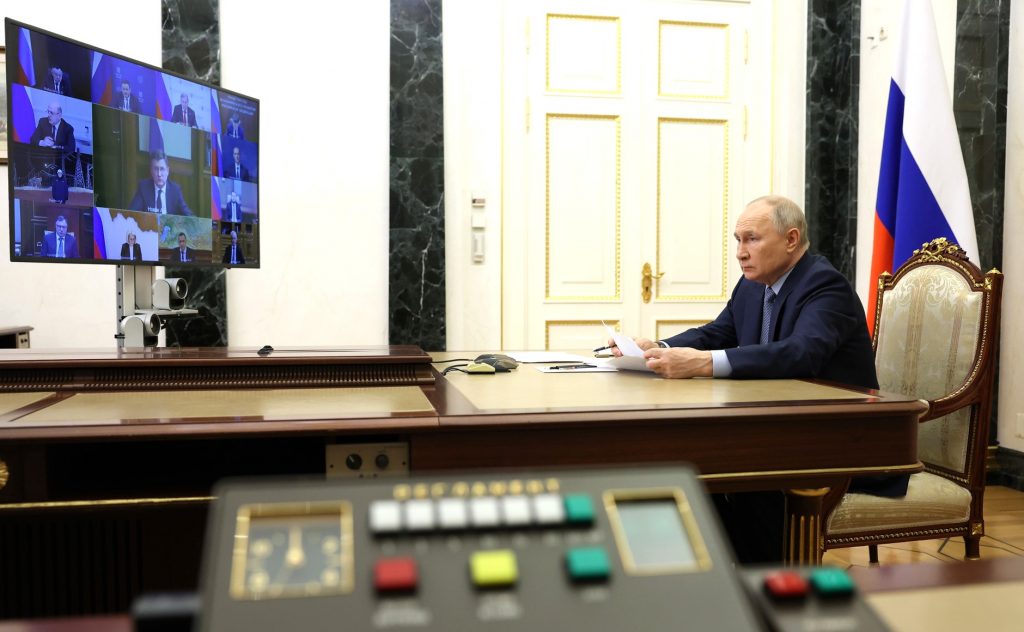
On Wednesday, February 7, a meeting between Vladimir Putin and members of the Russian Government took place online. According to official data, the main topic of the meeting was the development of air transportation in the medium term. In addition, the meeting participants managed to discuss several operational issues.
The meeting was attended by: Prime Minister Mikhail Mishustin, First Deputy Prime Minister Andrei Belousov, Deputy Prime Minister Alexander Novak, Deputy Prime Minister Victoria Abramchenko, Deputy Prime Minister Tatyana Golikova, Deputy Prime Minister Dmitry Grigorenko, Minister of Industry and Trade Denis Manturov, Deputy Chairman Government Alexei Overchuk, Presidential Plenipotentiary Representative in the Far Eastern Federal District Yuri Trutnev, Deputy Prime Minister Marat Khusnullin, Presidential Aide Maxim Oreshkin, Minister of Economic Development Maxim Reshetnikov, Minister of Labor and Social Protection Anton Kostyakov, and Minister of Finance Anton Siluanov.
Key theses:
- Putin: “The first question concerns the development of the Eastern railway range. This also almost directly relates to what we will discuss, although we will talk more about aviation. But this is still the transport industry. In this regard, we must achieve an increase in transportation figures in the Far Eastern direction. This year, they should amount to 180 million tons; by the end of 2030, they should reach 210. But to solve these problems, we need to address several issues, including the electrification of the Eastern railway range. We have certain plans, and relevant work is being carried out in this direction.”
- Novak: “The total investment in constructing and reconstructing energy infrastructure is 1.4 trillion rubles. Of these, 440 billion have already been financed, including 273 billion rubles financed from Rosseti’s funds and 167 billion rubles of investment attracted to developing generating capacities.”
- Kostyakov: “The adopted three-year budget, per current legislation, provides for all the necessary resources for indexing social benefits and several insurance payments. Today, there are two approaches to increasing the size of basic support measures. The first is an increase from January 1 in insurance pensions and payments, the amount of which is tied to the subsistence level. So, since the beginning of the year, our insurance pensions have increased by 7.5 per cent, as you have already said, dear Vladimir Vladimirovich, and the average amount of such an old-age pension for non-working citizens today is 23,400 rubles. In total, January indexation allowed increasing pension payments to almost 31 million people.”
- Kostyakov: “The second approach to indexation is an increase in support measures from February 1 according to the level of actual inflation over the past year. This indexation affects a total of 40 payments. They actually reach 20 million people. And from February 1, we indexed monthly cash payments provided to veterans, Heroes of the Soviet Union, Heroes of the Russian Federation, citizens affected by radiation, and citizens with disabilities by 7.4 per cent.”
- Putin: “Domestic air transport carried over 105 million passengers last year. The increase was 10.7 per cent. This is more than previously predicted; we assumed we would transport around 103 million people.”
- Putin: “I would like to dwell separately on the cost of air tickets. Let me emphasise that it is important to prevent excessive increases in ticket prices while unconditionally ensuring the quality of passenger service and flight safety. These issues should be a priority for carriers, the Ministry of Transport, and other relevant departments.”
- Putin: “We have drawn up large-scale plans in this area. Please tell us about how they are being implemented. Of course, I know what is happening there, but nevertheless, the purpose of our meeting today is to focus on some issues that require special attention. Therefore, I would like to hear how cooperation has been established in engine manufacturing, other units, materials and components, and what time frames are planned for aircraft delivery.”
Outcomes and outlook:
The situation in the air transportation sector in Russia causes concern among the country’s leadership:
- Because of the danger of shelling and attacks from Ukraine.
- Due to the rising cost of transportation by air (a global trend).
- Due to the deterioration of the aircraft fleet and the insufficient number of parts to repair old aircraft (the sanctions hit this sector the hardest).
Thus, Putin is waiting for a detailed plan from the government to restore order in the industry since plane crashes in Russia have recently become more frequent (so far in small aviation).
- Meeting of Vladimir Putin with the Chief Rabbi of Russia, Berl Lazar, and the President of the Federation of Jewish Communities of Russia, Alexander Boroda
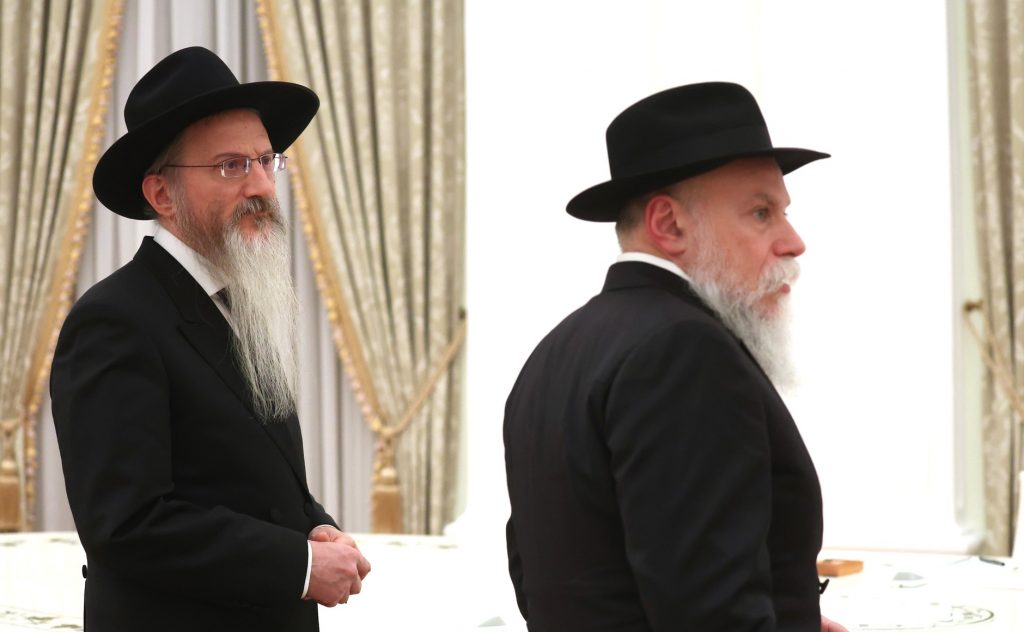
On Wednesday, February 5, Vladimir Putin met in the Kremlin with the Chief Rabbi of Russia, Berl Lazar and the President of the Federation of Jewish Communities of Russia, Alexander Boroda. The meeting was held in a closed format, but during the official part, Putin managed to note that one of the main issues for discussion would be the situation in the Middle East. At the same time, it cannot be ruled out that this meeting also became part of Putin’s election campaign (last week, he held a meeting with Patriarch Kirill; next week, he is planning a meeting with Muftin Sheikh Ravil Gainutdin).
Key theses:
- Putin: “You know that after the escalation of the situation in the Middle East, Russia is doing everything to help people who are held hostage. It is known that our Foreign Ministry works through the political wing of Hamas, and in general, there are certain results. First of all, we pay attention to citizens of Russia, not only citizens of the Russian Federation – but also citizens of other countries. This also applies to older people and members of their families who went through the Holocaust.”
Outcomes and outlook:
The meeting was mainly official and was dictated by
a) the elections and the need to interact with the Jewish communities of the Russian Federation (according to official data, there are now 132 thousand Jews living in Russia, and their number has decreased by 20 thousand over the past three years; the reason for the reduction is mass migration);
b) the need to find a compromise with former compatriots and with influential Jewish circles in a situation where Russia took the Arab side in the Gaza issue.
Putin is trying to demonstrate that it is not Israel that he does not support but its current leadership and is calling for compromise. In addition, the issue of Israel is significant for Donald Trump, who actively supports the Israeli side. Attempts to compromise with the Jewish clergy in Russia and with Jewish communities are an additional “bridge” for negotiations with Trump, who in Russia is already considered the de facto winner of the presidential race, which will end in the United States in November 2024.
- Telephone conversation between Vladimir Putin and President of Azerbaijan Ilham Aliyev
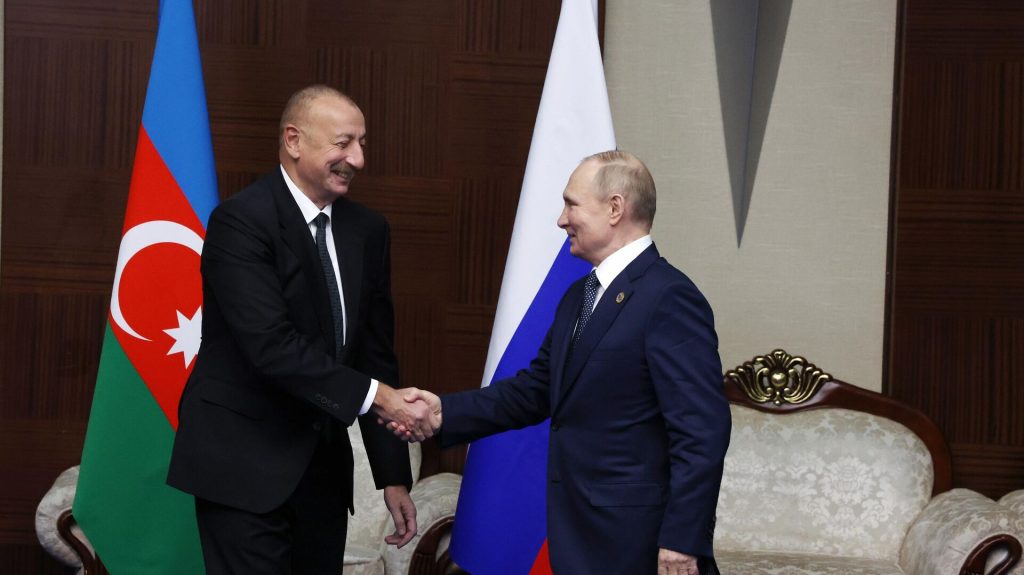
On Thursday, February 8, Vladimir Putin had a telephone conversation with President of Azerbaijan Ilham Aliyev. The main topic of discussion was Aliyev’s congratulations on his victory in the early presidential elections, which took place on February 7. The Russian president also sent an official telegram of congratulations to his Azerbaijani counterpart.
Key theses:
- Putin: “The voting results fully confirm your high political authority and popular support for the course you are pursuing to accelerate the socio-economic development of Azerbaijan and strengthen its position on the world stage.”
- Putin: “We attach great importance to allied relations with Baku. I am confident that we will continue active joint work to build fruitful bilateral cooperation in all areas and partnerships in resolving current issues on the international agenda. This undoubtedly meets the interests of our friendly peoples and goes in line with strengthening stability and security in the South Caucasus and the Caspian region.”
Outcomes and outlook:
A protocol call was caused by Ilham Aliyev’s victory in the early presidential elections. However, recently, relations between Moscow and Baku have been developing rapidly. The Azerbaijani-Turkish lobby in Moscow is doing its job: Russia and Azerbaijan are getting closer and closer. Considering that until 2013 Russia had difficulties accessing Caspian oil production in the territory of Azerbaijan and that Russia has traditionally placed greater emphasis on developing relations with Armenia, the turn towards Azerbaijan was a genuinely revolutionary diplomatic step. Thus, Russia relied on developing the Islamic factor in the Caucasus (political conflicts facilitated this, first with Georgia and then with Armenia). Soon, we can expect a strengthening of Russia’s relations with Azerbaijan and its closest partner, Turkiye.
- Telephone conversation between Vladimir Putin and Chinese President Xi Jinping
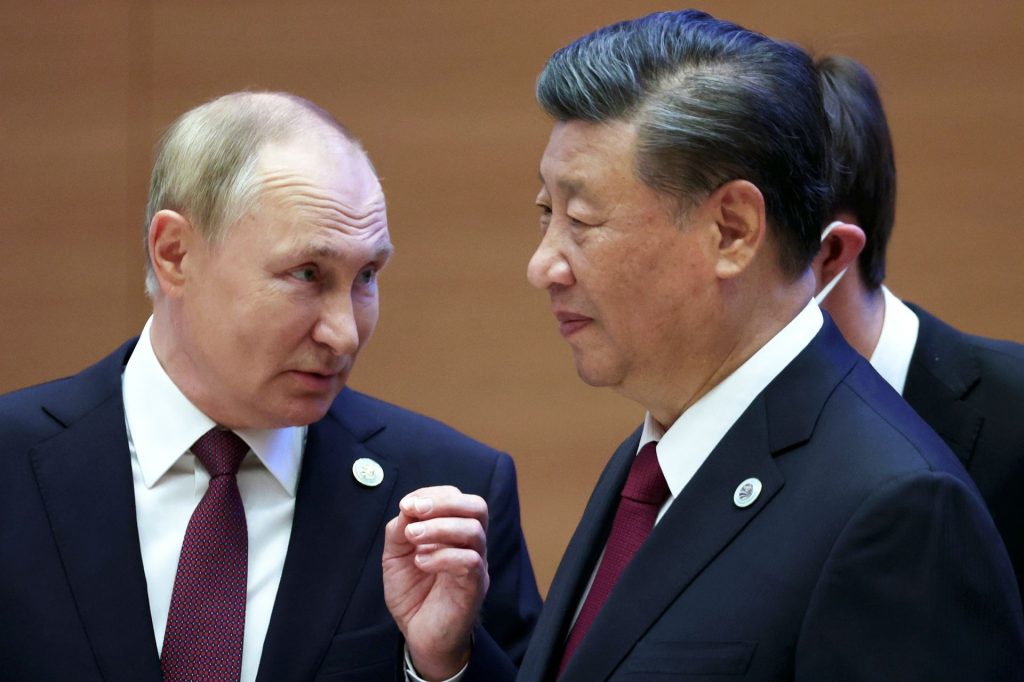
On Thursday, February 8, Vladimir Putin spoke with Chinese President Xi Jinping. According to official data, the Russian president congratulated his Chinese colleague and the entire Chinese people on the upcoming Spring Festival. The parties also summed up the development of the Russian-Chinese comprehensive partnership and strategic interaction over the recent period.
In the context of the 75th anniversary of the establishment of diplomatic relations celebrated this year, mutual interest was expressed in further promoting cooperation in all areas, including energy, finance, infrastructure and transport, industry and agriculture, humanitarian and sports exchanges.
Both sides confirmed their readiness to increase foreign policy coordination within various multilateral structures, particularly the UN, BRICS, and the Shanghai Cooperation Organization. Xi Jinping expressed support for the priorities of the Russian presidency of the BRICS Association.
There was also a substantive exchange of views on the situation in many regions of the world, including the Middle East, where the approaches of Russia and China in favour of a political and diplomatic settlement of the Palestinian problem within the generally recognised international legal framework coincide entirely.
Outcomes and outlook:
The supposedly ritualistic call (to greet the Chinese New Year) actually has deeper purposes. During the “celebratory” call, Putin tried to agree on unblocking financial settlements between Russian and Chinese enterprises and on a new visit to Beijing in 2024. Also, China and Russia have recently demonstrated a common position on several political issues, including Ukrainian and Middle Eastern issues. We can expect several new public statements from China about geopolitical positions soon. Recently, Beijing’s diplomacy has shown a fundamental change and become more assertive. In this case, Russia is an increasingly advantageous partner and ally.
- Tucker Carlson interviewed Vladimir Putin
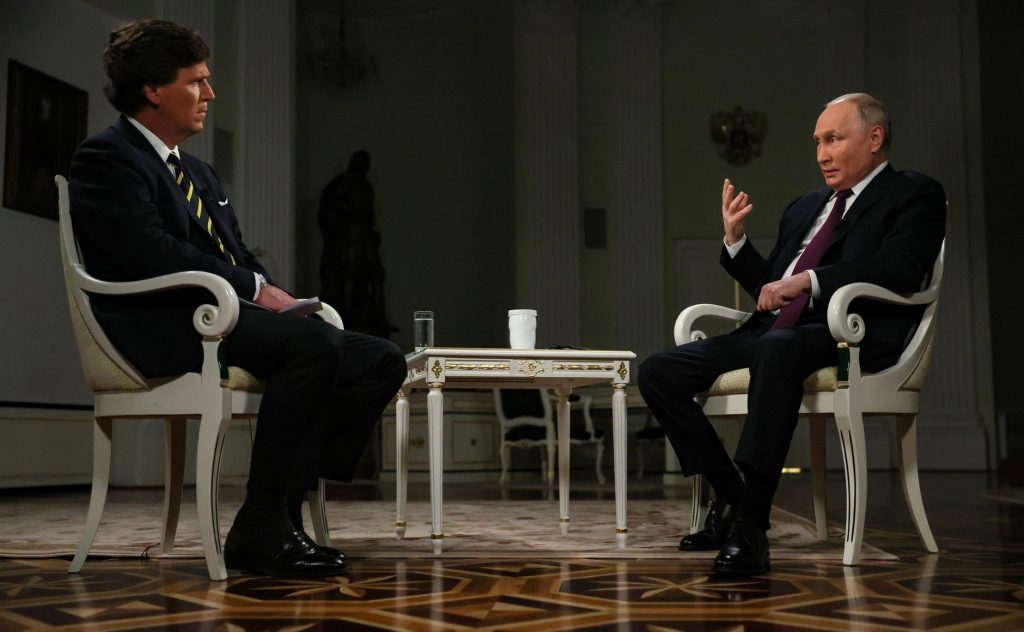
On Friday, February 9, the previously widely announced interview of Vladimir Putin with American journalist Tucker Carlson was published on the Tucker Carlson Network video platform. Despite the noticeable excitement caused by the publication of this interview, the Russian president did not voice virtually any new theses. At the same time, Putin’s well-known views on historical and geopolitical events were repeated.
Key theses:
- “The southern part of the Russian lands, including Kyiv, gradually gravitated towards another “magnet” – towards the centre that was taking shape in Europe. This was the Grand Duchy of Lithuania. It was even called Lithuanian-Russian because Russians comprised a significant part of this state. They spoke Old Russian and were Orthodox. But then a unification took place – the union of the Grand Duchy of Lithuania and the Kingdom of Poland.”
- “But the Poles for decades have been engaged in the Polishisation of this part of the population: they introduced their language there, they began to introduce the idea that these are not entirely Russians, that since they live on the edge, they are Ukrainians. Initially, the word “Ukrainian” meant that a person lives on the outskirts of the state, “at the edge,” or is engaged in border service. It didn’t mean any particular ethnic group.”
- “So the Poles did everything they could to polish and, in principle, treated this part of the Russian lands quite harshly, if not cruelly. All this led to the fact that this part of the Russian lands began to fight for their rights. And they wrote letters to Warsaw, demanding their rights be respected, so that people would be sent here, including to Kyiv…”
- “And in 1654, a little earlier even, the people who controlled power in this part of the Russian lands turned to Warsaw, I repeat, demanding that people of Russian origin and the Orthodox faith be sent to them. And when Warsaw, in principle, did not answer them anything and practically rejected these demands, they began to turn to Moscow so that Moscow would take them in.”
- “Here are letters from Bogdan Khmelnytsky, then the man who controlled power in this part of the Russian lands that we now call Ukraine. He wrote to Warsaw demanding respect for their rights, and after being refused, he began writing letters to Moscow asking him to take them under the strong hand of the Moscow Tsar. Here [in the folder] are copies of these documents. I will leave them for you as a good memory. There is a translation into Russian, then you will translate it into English.”
- “The West fears a strong China more than a strong Russia because there are 150 million people in Russia and one and a half billion in China, and the Chinese economy is developing by leaps and bounds – more than five per cent a year, it was even more. But this is enough for China. Bismarck once said that the main thing is potential. China’s potential is colossal; it is the first economy in the world today in terms of purchasing power parity and economic volume. We have already overtaken the United States for a long time, and the pace is growing.”
- “At a meeting here, in the Kremlin, with Bill Clinton, who was leaving power – right here, in the next room – I told him, asked a question: listen, Bill, what do you think, if Russia raised the question of joining NATO, Do you think this is possible? Suddenly he said: you know, this is interesting, I think so. And in the evening, when we met at dinner, he said: you know, I talked to my people, to my team – no, now this is impossible. You can ask him; I think he will hear and confirm our interview. I would never have said anything like that if it hadn’t happened. Well, okay, now it’s impossible.”
- “After President Kuchma, Viktor Yanukovych won the elections. But his opponents did not recognise this victory; the United States supported the opposition and scheduled a third round. What is it? This is a coup d’état. The USA supported him, and he came to power in the third round… Imagine that someone didn’t like something in the USA – they arranged a third round, which is not provided for in the US Constitution. Nevertheless, they did it there [in Ukraine]. Okay, Viktor Yushchenko, who was considered a pro-Western politician, came to power. Okay, but we also established relations with him; he went to Moscow on visits, we went to Kyiv, and I went. We met in an informal setting. Western is Western – so be it. Let it be, but people work. The situation must develop internally in independent Ukraine itself. The situation worsened after he led the country, and Viktor Yanukovych finally came to power.”
- “Denazification. After gaining independence, Ukraine began to search, as some analysts in the West say, for its identity. And I couldn’t think of anything better than to put the false heroes who collaborated with Hitler at the forefront of this identity.”
- “Everything is straightforward. We, I repeat, have contacts through various departments. I’ll tell you what we are saying about this and what we are conveying to the US leadership: if you want to stop hostilities, you need to stop the supply of weapons – everything will be over within a few weeks, that’s all, and then you can agree on some then, before you do it, stop.”
- “There [in Ukraine] are mercenaries from the United States. Most of the mercenaries are from Poland, in second place are mercenaries from the United States, and in third place are from Georgia. If someone has the desire to send regular troops, this will certainly put humanity on the brink of a severe global conflict. It is obvious”.
- “In a propaganda war, it is tough to defeat the United States because it controls the world’s media and many European ones. The ultimate beneficiary of the largest European media is American foundations. Don’t you know this? Therefore, you can get involved in this work, but it is, as they say, more expensive for you. We can simply expose our sources of information, but we will not achieve results. It’s already clear to the whole world what happened, and even American analysts are talking about it directly.”
- “You said that the world is divided into two hemispheres. The head is divided into two hemispheres: one is responsible for one activity area, the other is more creative, and so on. But it’s still one head. The world must be united for security to be common, not designed for this “golden billion”. And then – only in this case – the world will be stable, sustainable and predictable. And as long as the head is divided into two parts, it is a serious disease. The world is going through this period of severe illness.”
- “You know, this is one of the gravest strategic mistakes of the political leadership of the United States – using the dollar as an instrument of foreign policy struggle. The dollar is the basis of the power of the United States. I think everyone understands this very well: no matter how many dollars you print, they fly worldwide. Inflation in the USA is minimal: in my opinion, three per cent, approximately 3.4, is absolutely acceptable for the USA. And they print endlessly, of course. What does a debt of 33 trillion say? This is an emission.”
- “I repeat once again: we have repeatedly proposed to seek a solution to the problems that arose in Ukraine after the 2014 coup d’etat by peaceful means. But no one listened to us. And what’s more, the Ukrainian leadership, which was under complete control of the United States, suddenly announced that it would not implement the Minsk agreements – they didn’t like anything there – and continued military activity in this territory. In parallel, this territory was being developed by NATO military structures under the guise of various centres for the training and retraining of personnel. They essentially began to create bases there. That’s all”.
- “We have made so many goodwill gestures that I think we have reached our limits. No one has ever responded to our goodwill gestures with similar gestures. But we, in principle, are ready to say that we do not exclude the possibility of doing this with counter-movement from our partners.”
- “Listen, I already said: we didn’t refuse negotiations. We are not refusing – this is the Western side, and Ukraine is a satellite of the United States today. It is obvious. I don’t want this to sound like a curse or insult to someone, but we understand, right? What’s going on?”
- “Why are the Ukrainian authorities taking away the Russian Orthodox Church? Because it unites not the territory, but the soul, and no one will be able to divide it.”
Outcomes and outlook:
The interview with Tucker Carlson is one of those performances for which the anticipation was more meaningful than the actual performance. The interview, which was absolutely empty in meaning and content, in which Putin did not say anything new or extremely important, turned into a lecture on history with many factual errors. It is not surprising that the interview turned out to be a failure, despite the excitement in information networks around Tucker Carlson’s very arrival in Russia. In two days, 180 million people watched the interview on platform X (for example, the interview with Viktor Orban was watched by more than 250 million people during the same time). One gets the impression that the interview was ill-conceived and unprepared. Putin has lost the sharpness of reaction characteristic of him in other situations. He had no sense of timing and paid much attention to secondary points. Tucker Carlson, who usually conducts interviews rather harshly, was soft with Putin and very polite. This was not at all reminiscent of Carlson’s signature style to which the viewer was accustomed.
It is no coincidence that there has already been criticism of the interview itself in Russia itself and even in Putin’s circle. The group of Kovalchukov and Kiriyenko, according to available data, accused the “media block” in the Presidential Administration (Dmitry Peskov and Alexei Gromov) of failing to cope with the task and not approaching such an important interview with the proper technology. For example, such important messages as the ideological closeness of the Trumpists and the Russian leadership, based on social conservatism and traditionalism, were not conveyed in the interview. This could position Russia and its leader in a completely different way and send a signal within American society.
The attempt to give the message: “Putin is for peace, Trump is for peace, which means only Biden is for war” was inexpressive. Even if we consider that Putin was trying to send signals to the American consumer of information, these signals were not precise and specific. The interview came out blurry.
The only hope of Kremlin supporters is that Tucker Carlson, now more of a politician than a journalist, arrived not so much for an interview but for personal communication with Putin and brought a specific message, which was discussed behind closed doors, and the interview is just a screen.
- Meeting with permanent members of the Security Council
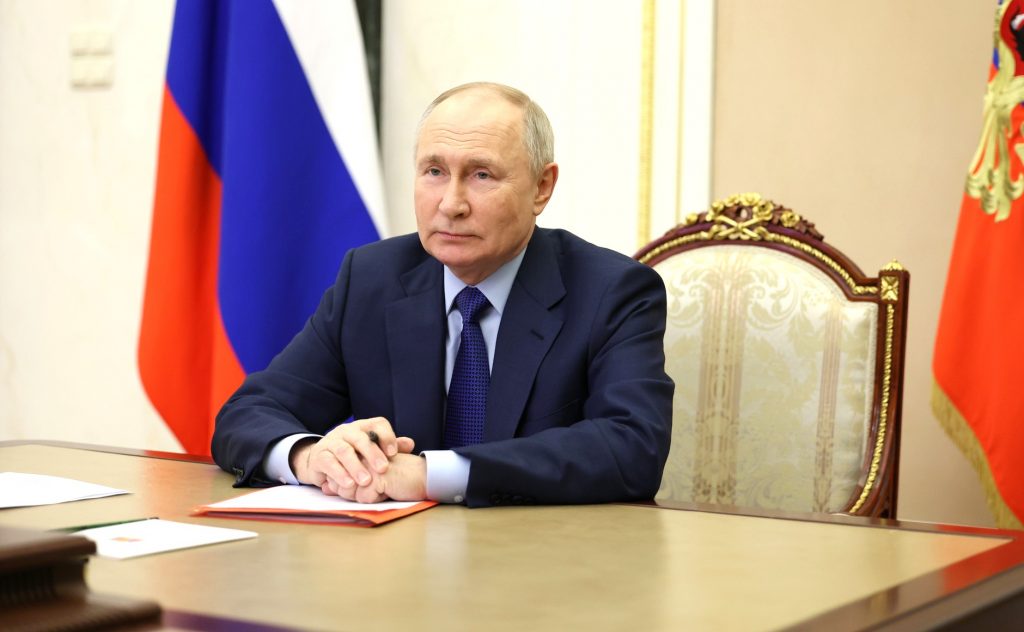
On Friday, February 9, Vladimir Putin held a meeting via videoconference with permanent members of the Security Council. It is noteworthy that over the past year, the Russian president held such meetings on a weekly basis. In 2024, it was only the second – the previous meeting with members of the Security Council took place on January 19.
According to official statements, the main topic of the meeting was preparation for possible forest fires and floods, which are a regular problem in the spring and summer. The main speaker on this topic was the Minister of Civil Defense, Emergency Situations and Disaster Relief, Alexander Kurenkov.
Also taking part in the meeting were Prime Minister Mikhail Mishustin, Chairman of the Federation Council Valentina Matvienko, Chairman of the State Duma Vyacheslav Volodin, Deputy Chairman of the Security Council Dmitry Medvedev, Head of the Presidential Administration Anton Vaino, Secretary of the Security Council Nikolai Patrushev, Minister of Internal Affairs Vladimir Kolokoltsev, Minister of Foreign Affairs Sergei Lavrov, Director of the Federal Security Service Alexander Bortnikov, Director of the Foreign Intelligence Service Sergei Naryshkin, Special Representative of the President on environmental issues, ecology and transport Sergei Ivanov.
Outcomes and outlook:
The declared topic was only an element of the official version. Still, most likely, it was about the effectiveness of countering sabotage on the part of Ukraine and Ukrainian proxies, which also use the tactics of guerrilla warfare of small groups – primarily in the forests of the Bryansk and Kursk regions. Thus, it seems that the officially declared topic concerns the “forest” to one degree or another, but there is a nuance. Also, according to Ascolta, issues of countering attacks by unmanned aerial vehicles on infrastructure facilities in Russia were discussed during the meeting.

